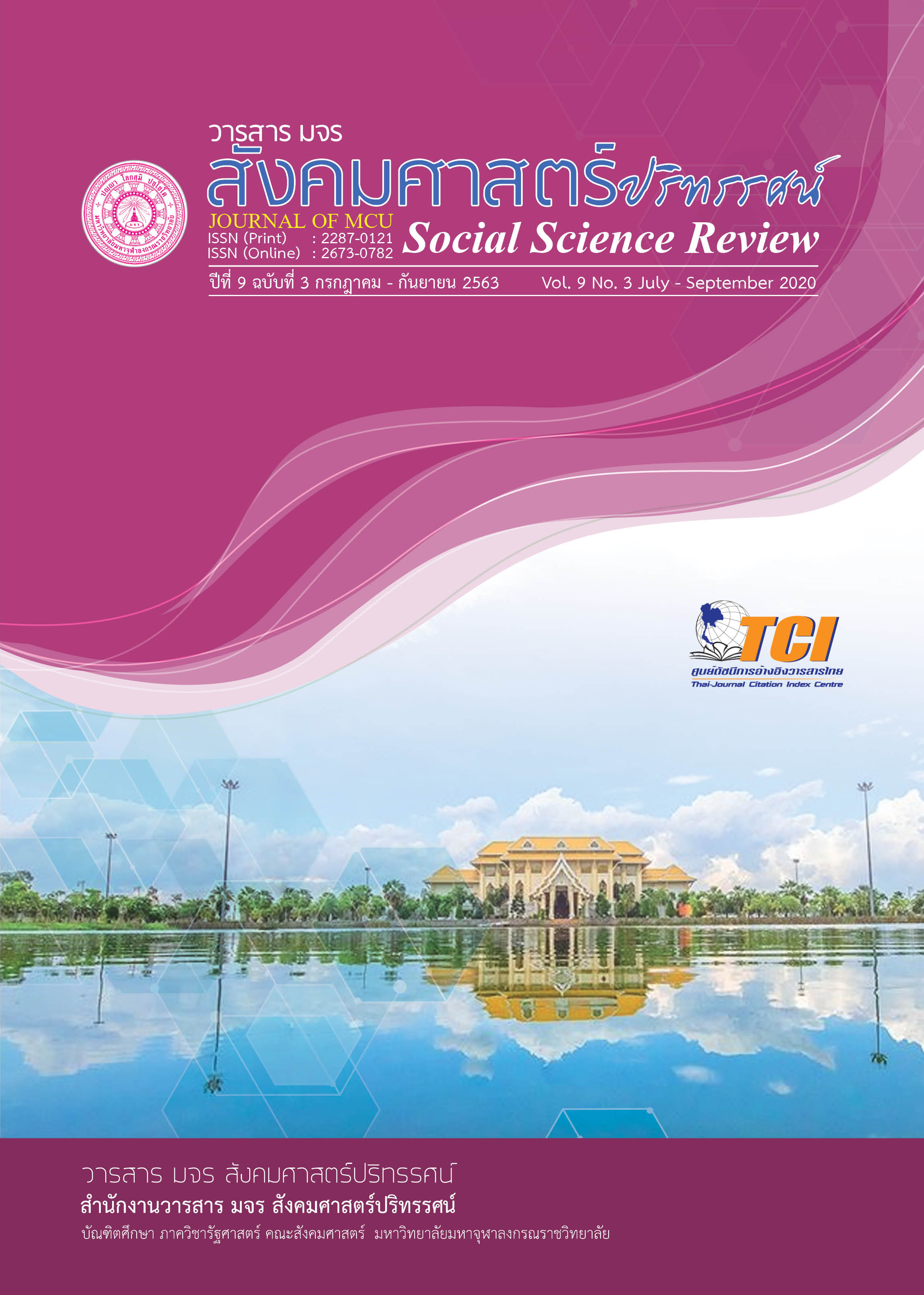คนรักเท่าผืนหนัง คนชังเท่าผืนเสื่อ : บริหารคนในองค์กรอย่างไรให้มีคนรักมากกว่าคนชัง
คำสำคัญ:
บริหารองค์กร, อคติ 4, สังคหวัตถุ 4บทคัดย่อ
การบริหารคนองค์กรเป็นทั้งศาสตร์และศิลป์ที่ผู้นำองค์กรทุกคนจำเป็นต้องมี โดยเริ่มจากการเข้าใจและปราศจากอคติ 4 คือ การบริหารที่เต็มไปด้วยความลำเอียง ได้แก่ ลำเอียงเพราะรัก ลำเอียงเพราะชัง ลำเอียงเพราะหลง และลำเอียงเพราะกลัว ควรบริหารคนในองค์กรฐานคติที่ว่าทำอย่างไรให้มีแต่คนรักมากกว่าคนชัง โดยยึดหลักหลักสำคัญในการบริหารคนในองค์กรให้มีประสิทธิภาพนั้น มีหลักการและวิธีการ ประกอบด้วย 1) สื่อสารให้บุคลากรและทีมงานเห็นภาพรวมขององค์กร 2) มอบหมายงานและความรับผิดชอบ 3) การให้ความสำคัญและพัฒนาบุคลากร ช่วยบุคลากรในการกำหนดเป้าหมายส่วนตน 4) การสร้างแรงจูงใจ เช่นให้รางวัลบุคลากร 5) เป็นพี่เลี้ยง 6) ให้ข้อมูลป้อนกลับ และยึดหลักตามแนวพระพุทธศาสนาโดยใช้หลักสังคหวัตถุ 4 อันได้แก่ ทาน ปิยวาจา อัตถจริยา และสมานัตตตา
เอกสารอ้างอิง
ไกรศักดิ์ รัตนตระกูล. (2555). เทคนิคการบริหารจัดการที่มีประสิทธิภาพกรณีศึกษาการแบ่งงานภาครัฐ อบจ. มุกดาหาร. จังหวัดมุกดาหาร (วิทยานิพนธ์ปริญญารัฐประศาสนศาสตรมหาบัณฑิต). ขอนแก่น: มหาวิทยาลัยขอนแก่น.
ธรรมะรักษา. (2532). พระไตรปิฎกสุภาษิต. กรุงเทพฯ: รุ่งแสงการพิมพ์.
เปรมจิตร ไชยลังคะ. (2560). ความคิดเชิงลบโดยอัตโนมัติของภาวะซึมเศร้าทัศนคติที่บิดเบือนและความคิดในทางที่ผิดของผู้ใช้แอมเฟตามีนที่มีอายุระหว่าง 18-24 ปี. วารสารสาธารณสุขศาสตร์, 10(1), 73-85.
เสน่ห์ จุ้ยโต. (2545). องค์การสมัยใหม่: ตัวเเบบห้าเอส. วารสารสุโขทัยธรรมาธิราช, 15(1), 48-55.
Wikipedia. อวิชชา. สืบค้น 25 กรกฎาคม 2563, จาก https://th.wikipedia.org/ wiki/awitcha.
ดาวน์โหลด
เผยแพร่แล้ว
รูปแบบการอ้างอิง
ฉบับ
ประเภทบทความ
สัญญาอนุญาต
ลิขสิทธิ์ (c) 2020 วารสาร มจร สังคมศาสตร์ปริทรรศน์

อนุญาตภายใต้เงื่อนไข Creative Commons Attribution-NonCommercial-NoDerivatives 4.0 International License.
เพื่อให้เป็นไปตามกฎหมายลิขสิทธิ์ ผู้นิพนธ์ทุกท่านต้องลงลายมือชื่อในแบบฟอร์มใบมอบลิขสิทธิ์บทความให้แก่วารสารฯ พร้อมกับบทความต้นฉบับที่ได้แก้ไขครั้งสุดท้าย นอกจากนี้ ผู้นิพนธ์ทุกท่านต้องยืนยันว่าบทความต้นฉบับที่ส่งมาตีพิมพ์นั้น ได้ส่งมาตีพิมพ์เฉพาะในวารสาร มจร สังคมศาสตร์ปริทรรศน์ เพียงแห่งเดียวเท่านั้น หากมีการใช้ภาพหรือตารางหรือเนื้อหาอื่นๆ ของผู้นิพนธ์อื่นที่ปรากฏในสิ่งตีพิมพ์อื่นมาแล้ว ผู้นิพนธ์ต้องขออนุญาตเจ้าของลิขสิทธิ์ก่อน พร้อมทั้งแสดงหนังสือที่ได้รับการยินยอมต่อบรรณาธิการ ก่อนที่บทความจะได้รับการตีพิมพ์ หากไม่เป็นไปตามข้อกำหนดเบื้องต้น ทางวารสารจะถอดบทความของท่านออกโดยไม่มีข้อยกเว้นใดๆ ทั้งสิ้น





